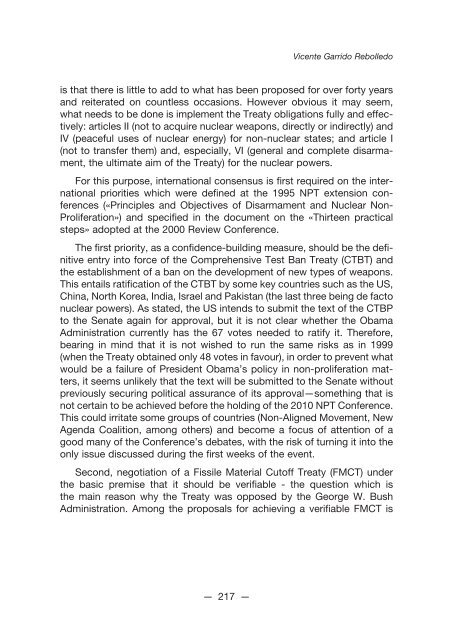Strategic Panorama 2009 - 2010 - IEEE
Strategic Panorama 2009 - 2010 - IEEE
Strategic Panorama 2009 - 2010 - IEEE
You also want an ePaper? Increase the reach of your titles
YUMPU automatically turns print PDFs into web optimized ePapers that Google loves.
Vicente Garrido Rebolledo<br />
is that there is little to add to what has been proposed for over forty years<br />
and reiterated on countless occasions. However obvious it may seem,<br />
what needs to be done is implement the Treaty obligations fully and effectively:<br />
articles II (not to acquire nuclear weapons, directly or indirectly) and<br />
IV (peaceful uses of nuclear energy) for non-nuclear states; and article I<br />
(not to transfer them) and, especially, VI (general and complete disarmament,<br />
the ultimate aim of the Treaty) for the nuclear powers.<br />
For this purpose, international consensus is first required on the international<br />
priorities which were defined at the 1995 NPT extension conferences<br />
(«Principles and Objectives of Disarmament and Nuclear Non-<br />
Proliferation») and specified in the document on the «Thirteen practical<br />
steps» adopted at the 2000 Review Conference.<br />
The first priority, as a confidence-building measure, should be the definitive<br />
entry into force of the Comprehensive Test Ban Treaty (CTBT) and<br />
the establishment of a ban on the development of new types of weapons.<br />
This entails ratification of the CTBT by some key countries such as the US,<br />
China, North Korea, India, Israel and Pakistan (the last three being de facto<br />
nuclear powers). As stated, the US intends to submit the text of the CTBP<br />
to the Senate again for approval, but it is not clear whether the Obama<br />
Administration currently has the 67 votes needed to ratify it. Therefore,<br />
bearing in mind that it is not wished to run the same risks as in 1999<br />
(when the Treaty obtained only 48 votes in favour), in order to prevent what<br />
would be a failure of President Obama’s policy in non-proliferation matters,<br />
it seems unlikely that the text will be submitted to the Senate without<br />
previously securing political assurance of its approval—something that is<br />
not certain to be achieved before the holding of the <strong>2010</strong> NPT Conference.<br />
This could irritate some groups of countries (Non-Aligned Movement, New<br />
Agenda Coalition, among others) and become a focus of attention of a<br />
good many of the Conference’s debates, with the risk of turning it into the<br />
only issue discussed during the first weeks of the event.<br />
Second, negotiation of a Fissile Material Cutoff Treaty (FMCT) under<br />
the basic premise that it should be verifiable - the question which is<br />
the main reason why the Treaty was opposed by the George W. Bush<br />
Administration. Among the proposals for achieving a verifiable FMCT is<br />
— 217 —

















